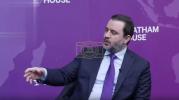סיריע באשולדיגט רוסלאנד נאך ציווילע האבן געליטן אונטער אסאד


In a striking departure from years of rigid loyalty to Moscow, Syria’s Foreign Minister Asaad al-Shaibani openly acknowledged Russia’s role in deepening the suffering of the Syrian people under the former Assad regime. Speaking in an interview hosted by Chatham House, al-Shaibani stated plainly that Russia was “a partner to the former regime and it participated in increasing the suffering of the Syrian people,” a rare admission from Damascus after more than a decade of conflict marked by Russian airstrikes, political shielding, and military intervention.
The remarks signal a significant diplomatic recalibration in post-Assad Syria. Rather than confronting Russia head-on, al-Shaibani emphasized that Syria’s new approach is “pragmatic” and not aimed at creating fresh conflict with Moscow. His message was clear: the new government wants stability, reconstruction, and international legitimacy—not another geopolitical standoff with a global power still entrenched in regional affairs.
Yet the minister also made it unmistakable that the Russia of Syria’s future will not resemble the Russia of its past. “The Russian role in Syria will not be that of the past,” he said, underscoring Damascus’s intent to reclaim sovereignty and distance itself from the heavy-handed foreign influence that defined the Assad years. It is a notable shift for a country long treated as a strategic outpost for Moscow’s ambitions, often at the expense of Syrian civilians.
By publicly recognizing Russia’s complicity in civilian suffering, the new Syrian leadership is attempting to distinguish itself from the abuses and alliances of the previous regime. The statement aligns with broader regional realignments and the growing push for accountability, transparency, and reconstruction without foreign domination.
This pivot also opens new doors for international engagement—especially from countries that refused to legitimize Assad’s Russia-backed rule. As Syria attempts to rebuild from the devastation left behind, the world will be watching to see whether words become policy, and whether Damascus truly moves toward a future free from the destructive partnerships that once defined it.
גאלערי
ווידעאס